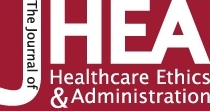We Welcome Latest
Research
Articles in
Field of
Medicine, Ethics and Healthcare Administration

About the Journal
The Journal of Healthcare Ethics & Administration (JHEA) is an international open-access online journal that reflects the issues on medicine and healthcare administration. The JHEA welcomes original researches, review articles and case studies by scholars, medical and law professionals, and healthcare administrators who desire to share knowledge through the dissemination of published works. Each published article in the journal is approved by an international editorial board before publication using a double-blind, peer-review process.
Currrent Issue Vol.10 No.1 (Winter 2024)
- Zachary M. Weisner DO, MSc, Ethan Collins DO, Katelyn Hanson DO, Herbert Patrick MD, Father Peter Clark SJ, Ph.D.
Address correspondence to: Zachary M. Weisner, DO, MSc. Email: Zachary.Weisner@jefferson.edu
Ethan Collins, DO. Email: Ethan.Collins@jefferson.edu
Katelyn Hanson, DO. Email: Katelyn.Hanson@jefferson.edu
Herbert Patrick, MD. Email: Herbert.Patrick@jefferson.edu
Peter Clark SJ, Ph.D. Email: pclark@sju.edu
Pages: 1-9
- Jeffrey Gruenglas, DHSc, MSc, MA, HEC-C, Roxana Menes, MPH, MA, Lori Rainchuso, DHSc, MS, RDH
Address correspondence to: Lori Rainchuso, MCPHS University, School of Arts and Science, 179 Longwood Avenue, Boston, MA 02115. Email: Lori.Rainchuso@mcphs.edu
Pages: 10-17
Evidence to guide dentistry on conflict of interest (COI) and professional-industry relationships is limited. To determine the breadth of literature regarding ethics in dentistry and COI relating to sponsorship. A scoping review following the PRISMA extension was performed. Medline/PubMed and Cochrane Library databases were used to identify peer-reviewed sources, published 2013-2023. Titles, abstracts, and full-text reviews were conducted by two independent reviewers. Disagreements were resolved by consensus. The remaining studies underwent critical appraisal. Key findings were extracted and analyzed. Adjusted for critical appraisal thresholds, we evaluated a total of (n=9) studies associated with dentistry, COI, and sponsorship (industry and non-profit research funding). The majority of evidence demonstrated a significant correlation with disclosure of COI and professional ethical conflict. More than 32% of publications demonstrated no clear disclosure or failed to report COI. Sponsored studies demonstrated significantly greater scrutiny of disclosure practices, whereas industry/dentist-reported payments were prevalent but varied widely (19% to 62%). Regardless of funding or influence, dental professionals are likely to disclose industry conflicts when presented with policies to guide transparency, thus strengthening patient trust and professional code of ethics.
Issue Vol.9 No.2 (Fall 2023)
- Rafaela Schaefer, Priscila Pereira da Silva Lopes, Camila Goulart Domingues, Martina Teixeira Ortega, Francine Ferreira Ribeiro, Manoela Zen Ramos
Address correspondence to: Rafaela Schaefer. E-mail rafaschaefer@unisinos.br Universidade do Vale do Rio dos Sinos – UNISINOS, Brazil.
Priscila Pereira da Silva Lopes. E-mail pri08silva@gmail.com Universidade do Vale do Rio dos Sinos – UNISINOS, Brazil.
Camila Goulart Domingues. E-mail cgoulartd@gmail.com Universidade do Vale do Rio dos Sinos – UNISINOS, Brazil.
Martina Teixeira Ortega. E-mail martinaortega@edu.unisinos.br Universidade do Vale do Rio dos Sinos – UNISINOS, Brazil.
Francine Ferreira Ribeiro. E-mail francineferreiraribeiro@hotmail.com Universidade do Vale do Rio dos Sinos – UNISINOS, Brazil.
Manoela Zen Ramos. E-mail manoelaramos99@gmail.com Universidade do Vale do Rio dos Sinos – UNISINOS, Brazil.
Pages: 1-12
An organization’s ethical climate reflects organizational practices, procedures, and policies with moral consequences and demonstrates the influence of the workplace on ethical practice. The aim of this article is to analyse ethical climate in health care facilities and the factors associated therewith. This is a systematic literature review. The searches were conducted in January 2023 in the Embase, Scopus, PUBMED, and BVS databases using the keyword ‘hospital ethical climate survey’. Studies that had administered the 26-item scale in its original, translated or adapted version to health care professionals and described their respective scores were included. Studies that used the HECS in a reduced form, as well as theoretical studies, reviews, theses, and dissertations, were excluded. Twenty-three studies published between 2009 and 2022 were selected. The mean score for organisational ethical climate was 3.51, and scores ranged from 3.19 to 3.82, with the less ethical climate scores for the ‘physicians’ subscale and the highest scores for the ‘peers’ subscale. The organizational ethical climate showed a statistically significant association with sociodemographic and work variables: a positive ethical climate reduces moral distress, burnout, mistakes, and intention to leave the job, while it increases job satisfaction, ethical leadership, perceptions of quality, competence, and empowerment. The organizational ethical climate can affect the decision-making and ethical behaviour of health care professionals, thus influencing workplace well-being and the quality of care delivered. Actions to promote a positive ethical climate should be implemented.
- Daniel DiSandro
Address correspondence to: Daniel DiSandro, Research Fellow at the Institute of Clinical Bioethics – Saint Joseph’s University. Email: dd717144@sju.edu Phone: 609-251-2215
Pages: 13-25
The mpox pandemic of 2022 signaled the global reemergence of a virus that had for years been endemic in Africa. While now the global outbreak has been relatively contained, the early months of the U.S. response were characterized by stigma, deficient resources, and a lack of coordination as thousands of individuals suffered. This paper first analyzes the history and origin of the monkeypox virus to put the current outbreak in context and illustrate what has and has not been learned. The medical aspects of the virus itself will be presented along with transmission, prevention, and treatment details. Next, despite the criticisms drawn from the U.S. public health response to the COVID-19 pandemic, the response to the mpox outbreak will be highlighted, focusing on the missteps and analyzing the consequences of the ill preparedness. Then, in order to begin remedying many of the issues seen over the past year, this issue is analyzed from a Catholic Social Teaching perspective to establish an ethical basis for the U.S.’s future responsibilities to its citizens and the world. Lastly, recommendations will be made to prepare the country for the next pandemic using language, federal, sexual health, vaccination, and research perspectives.
Issue Vol.9 No.1 (Spring 2023)
- John J. LoCurto, JD
Address correspondence to: John J. LoCurto, J.D. Assistant Professor of Medical Jurisprudence and Health Policy. University of the Incarnate Word School of Osteopathic Medicine. San Antonio. Texas. USA. Phone: (210) 619-7054. Email: locurto@uiwtx.edu
Pages: 1-24
Debates about health care often emphasize distributive justice. How should society allocate finite resources? Who will get access to them, who will not? Is the allocation fair? Who decides and by what standard? Answers to these questions rarely consider health care fraud, waste, and abuse. This is a material omission. Fraud alone costs the health care system billions of dollars annually, dissipating limited funds and degrading quality of care. This paper considers how fraud, waste, and abuse occur in Medicare Part C – better known as Medicare Advantage – an increasingly popular coverage option. Medicare Advantage experiences unique challenges that undermine the program and squander the public’s investment in it. Only by accounting for these programmatic vulnerabilities can we then go on to assess whether Medicare Advantage is an effective, cost-efficient, and equitable mechanism for delivering health insurance coverage.
- Charles Owusu-Aduomi Botchwey
Address correspondence to: Charles Owusu-Aduomi Botchwey. University of Education, Winneba. Faculty of Science Education. Department of Health Adm. & Education. Winneba-Central Region. Post Office Box 25. Phone: +233598014015. Email: chaboat08@yahoo.com
Pages: 25-33
Background: Because healthcare professionals are well versed in patients’ fundamental rights and obligations, people are growing more worried about their ethical behavior. The accusations regarding unethical behavior and the rise in legal action against healthcare providers frequently reflect this. Threats and intimidation directed at healthcare workers have also increased recently.
Objectives: The purpose of the study was to assess the knowledge and practice of healthcare ethics among healthcare professionals in Winneba Municipal Hospital and Trauma and Specialist Hospital in Effutu Municipality in the Central Region of Ghana.
Methods: The study used a descriptive cross-sectional design and a qualitative research approach. The research design used offered a deeper understanding of the experiences, phenomena, and settings under study while addressing the “what,” “how,” and “why” of the research questions. The interpretive approach was chosen as the research’s epistemological stance because it emphasised how unique humans are from the material world and how research methodologies should reflect this distinction.
Results: This study identified ethical issues bordering on areas of communication, decision-making, confidentiality, and professional duty as key themes for ethical reflection. It explored the experiences of healthcare professions in different fields of practice within the clinical context. The study also identified strategies for improving knowledge and adherence to ethical codes regarding the profession, which are education, routine orientation, workshops and retraining programmes.
Conclusion: Despite the commendable efforts of health professionals in adhering to healthcare ethics, policy-makers in the healthcare arena of Ghana such as the Ministry of Health, Ghana Health Service and the Association of Health Administration and Support Services should gear health policy towards enhancing staff-patient relationship.
Keywords: Healthcare professionals, patients’ fundamental rights and obligations, unethical behaviour, ethical reflection, Ethical codes and Communication.
Issue Vol.8 No.3 (Winter 2022)
- Usman Haseeb
Address correspondence to: Usman Haseeb. 900 E Leigh St, Richmond, VA 23298. Email: haseebua@vcu.edu
Pages: 1-8
End-of-life care is a topic that many consider to be an uncomfortable one given its emotional, ethical, and legal complexities. The scope of legal death in the US was made clearer by the approval of the 1981 Uniform Determination of Death Act (UDDA). The act is completely adopted word for word by most US states, but there are states like Louisiana that adopted the UDDA with some included criteria for neurological death. It is important to note that the UDDA is a legal guide used to make legal and medical decisions rather than a law that must be followed completely. With the advancement of medical technology, individuals can be kept alive through a variety of medical interventions that sustain necessary physiological functions, such as breathing, in the absence of complete mental status or other basic functions considered to be fundamental to life These modalities at times blur the line between life and death, and disagreement exists on the technical definitions and applications of these terms. The result is an ethical gray area in which medical care can be provided, but the question of whether it should be provided remains. This article is meant to examine the ethical and societal implications of end-of-life care to an individual who- depending upon the definition- may be considered dead.
- Allison M. Young, MD
Address correspondence to: Allison M. Young, MD. Assistant Professor, Departments of Internal Medicine and Pediatrics Virginia Commonwealth University Health System. Email: allison.young@vcuhealth.org
Pages: 9-12
The COVID-19 pandemic created significant strain on adult hospitals. Pediatric hospitals are now experiencing similar strain in the setting of an early spike in RSV cases. Hospitals use ambulance diversion and inpatient transfer restrictions to reduce flow to the hospital. However, there are mortality and ethical concerns related to these methods. Other methods that are frequently explored are confined to individual health systems despite the capacity strain typically being widespread, impacting multiple hospitals across a region at one time. In the setting of seeing more frequent hospital strain in both adult and pediatric populations, it is important to examine the options available and to plan for similar events in the future with cooperation across multiple health systems in an effort to provide the best possible outcomes for patients in a region while minimizing moral distress among patients and providers.
Issue Vol.8 No.2 (Fall 2022)
- Daniel J. Daly, Ph.D.
Address correspondence to: Daniel J. Daly, Ph.D. Associate Professor of Moral Theology. Boston College School of Theology and Ministry. Phone: 617-552-2285. Email: dalydc@bc.edu
Pages: 1-12
This paper addresses a perennial problem in Catholic organizational healthcare ethics. Catholic and secular ethicists have acknowledged that organizational healthcare ethics is underdeveloped. Scholars have traditionally focused on the “micro” issues arising in the clinical setting or the “macro” issues of national healthcare policy and health insurance. The “meso” or healthcare organizational level, involving both healthcare systems and hospitals has received far less attention. As a result, contemporary organizational healthcare ethics lacks a developed conceptual framework with which to analyze and guide the decision-making of HCOs. The paper responds to two specific deficiencies in the field. First, organizational ethics undertheorizes sociological realities. Second, the field employs exceedingly thin and incoherent ethical frameworks. Although scholars have introduced the term “organizational virtue,” they have yet to develop a robust account of the concept leaving healthcare leaders incapable of assessing organizational character or guiding moral decision-making. In sum, because neither “organization” nor “ethics” is well articulated, the entire project of organizational healthcare ethics loses its capacity to explain, guide, and assess human action and social outcomes. The paper directly addresses these deficiencies. First, it offers greater precision in the use of sociological terminologies, such as “structure,” “institution,” “organization,” and “culture.” Using critical realist social theory, the paper distinguishes between a social structure in the general sense, which is a “web of relations among social positions,” and an organization, which is a highly complex social structure containing positions of authority. Next, it synthesizes organizational theory with virtue theory to develop an account of organizational virtue ethics capable of aiding in organizational moral decision-making and assessment. It then articulates cardinal organizational virtues, including organizational prudence, justice, beneficence, and solidarity. The paper then applies the cardinal organizational virtues to a composite case.
- Jonai Wabwire
Address correspondence to: Jonai Wabwire. Lecturer, Kisii University, Dept. of Communication Media and Information Sciences. Phone: 0710619475. Email: wabwirejonai05@kisiiuniversity.ac.ke
Pages: 13-20
Science reporting is not a daily routine in most media houses in Kenya and worldwide at large. Unlike sports, politics, business, arts and culture, Science reporting is generally placed on the fringes of mainstream journalism. A critical analysis of media operations, shows that there are various deep-rooted factors that tend to keep science at the bottom of newsgathering, packing and dissemination. The beginning point is journalism schools that traditionally avoid admitting students with science backgrounds or strong interest in science reporting, preferring those excelling in literature, languages, history and others. The courses offered hardly mention the coverage of science. In addition, issues such as media social responsibility, newsroom competition, newswriting basics and how they affect reporting complex scientific issues have been extensively addressed. The article has also addressed the critical challenges facing science reporting, bridged the divide between science and journalists by looking at the tips crucial for science journalism.

